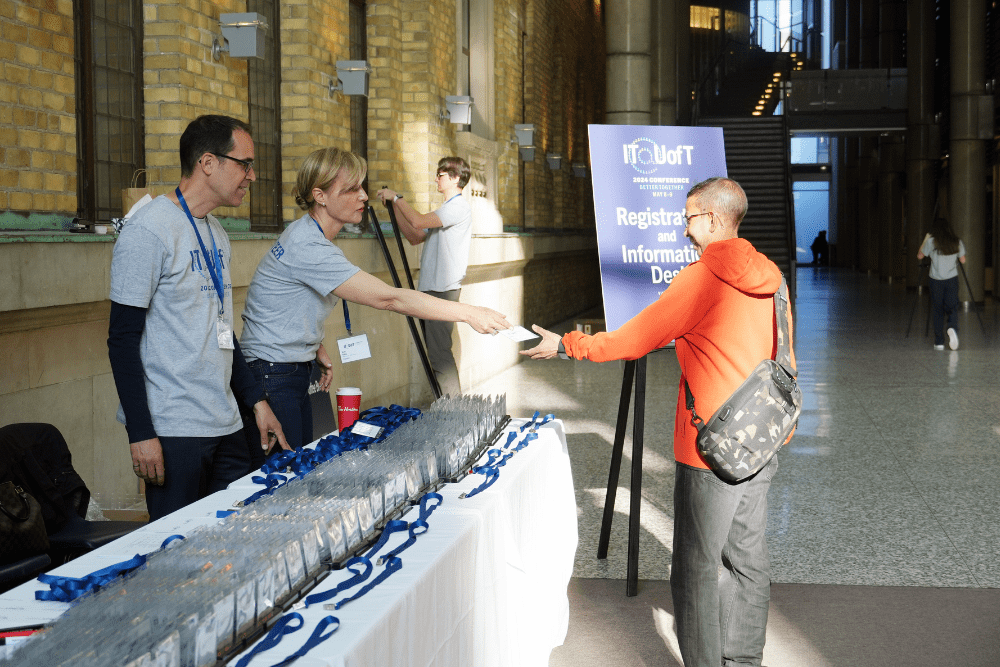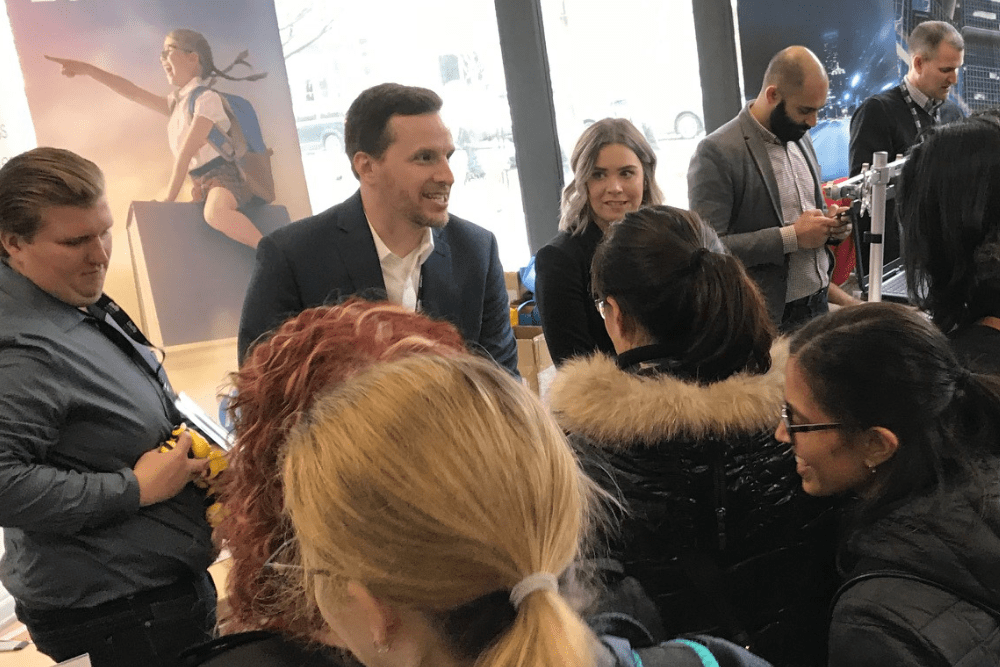The IT@UofT 2025 conference will offer many opportunities to learn and network with the tri-campus IT@UofT community, including keynote presentations, breakout sessions and more.
IT@UofT 2025 information desk
If you have questions during the conference, visit the information desk to speak with our volunteers and conference organizers.


Sponsor expo
Visit our sponsors to learn about their latest products.
May 7, 2025
Time
Location
Activity
9 – 9:50 a.m.
Breakout session block 1
Bahen Centre for Information Technology, Room 1160
- Natasha Reis, Research Security Advisor, Division of the Vice-President, Research & Innovation (VPRI)
- Michael Laurentius, Research Information Security Specialist, Information Security, Information Technology Services (ITS), St. George
Bahen Centre for Information Technology, Room 1200
- Keshav Raina, Administrative Officer/Data Analyst, Planning, Governance & Assessment (PGA), Information Technology Services (ITS), St. George
- Terry Spratt, Client Care Tech Support, Enterprise Applications & Solutions Integration (EASI), ITS, St. George
Bahen Centre for Information Technology, Room 1210
- Dinushy Elamurugan, Technology Adoption Consultant, Cybersecurity and Data Management, Education Commons, Ontario Institute for Studies in Education (OISE)
- Laize Bacay, Technology Adoption Consultant, OISE
Bahen Centre for Information Technology, Room 1240
Speaker: Naz Torabi, Collections Coordinator, Sciences, Collection Development Department, University of Toronto Libraries (UTL)
Myhal Centre for Engineering Innovation and Entrepreneurship, Room 360
- Adie Margineanu, User Experience Lead, Information and Instructional Technology Services (IITS), University of Toronto Scarborough (UTSC)
- Sebastian Toncu, Senior Analyst – Web Operations, IITS, UTSC
9:50 – 9:55 a.m.
Bahen Centre for Information Technology, Atrium / Myhal Centre for Engineering Innovation and Entrepreneurship
Break
9:55 – 10:45 a.m.
Breakout session block 2
Myhal Centre for Engineering Innovation and Entrepreneurship, The Lee & Margaret Lau Auditorium (Myhal 150)
Moderator: Dr. Donna K. Kidwell, Chief Information Officer (CIO)
- Saira Mall, Manager, Educational Innovation and Academic Initiatives, University of Toronto Scarborough (UTSC)
- Ravneet Kaur, Director, Strategy and Business Transformation, UTSC
- Aisha Maywandi, Information Technology Specialist, Information & Instructional Technology Services (IITS), UTSC
- Ammena Ajaz, Business Analyst, Information & Instructional Technology Services (I&ITS), University of Toronto Mississauga (UTM)
- Maddie Osei, Information Security and Business Analyst, Information Security, Information Technology Services (ITS), St. George
Bahen Centre for Information Technology, Room 1200
Speaker: Dr. Ryan Lahti, Technology Adoption Consultant, Education Commons, Ontario Institute for Studies in Education (OISE)
Bahen Centre for Information Technology, Room 1210
- Andy Foster, Senior Software Engineer, University of Toronto Libraries Information Technology Services (UTL ITS)
- Roman Zupancic, Systems Administrator – Devops, UTL ITS
Bahen Centre for Information Technology, Room 1240
Speaker: Mark Nunnikhoven, Principal, Office of the Chief Information Security Officer, AWS
This session is brought to you by AWS, a gigabyte sponsor.
10:45 – 11:05 a.m.
Bahen Centre for Information Technology, Atrium
Refreshment break
11:05 – 11:55 a.m.
Breakout session block 3
Bahen Centre for Information Technology, Room 1160
- Kanupriya Kejriwal, Information Security Risk Manager, Information Security, Information Technology Services (ITS), St. George
- Kalyani Khati, Associate Director, Information Security Strategic Initiatives, ITS
Bahen Centre for Information Technology, Room 1180
Speaker: Marden Dov Paul, Director, Planning, Governance & Assessment, Information Technology Services (ITS), St. George
Bahen Centre for Information Technology, Room 1200
- Peter Sverko, Manager, Client Support Services, Digital Workplace, Enterprise Applications & Solutions Integration (EASI), Information Technology Services (ITS), St. George
- Justin Charlick, Accruent EMS Coordinator, EASI, ITS
Bahen Centre for Information Technology, Room 1210
- Nikki Matarazzo, Artificial Intelligence Sales Executive, Dell Technologies
- Jim Pond, National Complex Compute Specialist, Dell Technologies
This session is brought to you by Dell Technologies, a gigabyte sponsor.
Myhal Centre for Engineering Innovation and Entrepreneurship, Room 360
- Sandeep Akkinapelli, Senior Developer and Database Analyst, Office of the Vice-Provost, Strategic Enrollment Management (VPSEM), University Registrar’s Office (URO), Student Financial Systems
- Michael Kwan, Senior Programmer Analyst, VPSEM/URO IT Services
11:55 a.m. – 12:55 p.m.
Myhal Centre for Engineering Innovation & Entrepreneurship, Lobby and Lee & Margaret Lau Auditorium (Myhal 150)
Lunch
12:55 – 1:45 p.m.
Breakout session block 4
Bahen Centre for Information Technology, Room 1160
- Belinda McKay, Executive Assistant, Office of the Chief Information Security Officer (CISO), Information Technology Services (ITS), St. George
- Jess Goldson, Education and Awareness Officer, Education, Awareness & Culture, ITS
- Lillian Hogendoorn, Web Project Manager and Content Strategy Librarian, University of Toronto Libraries (UTL)
- Samantha Chang, Faculty Liaison Coordinator, Teaching, Learning & Technology, Centre for Teaching Support & Innovation (CTSI)
- Laura Klamot, User Experience Designer, Enterprise Applications & Solutions Integration (EASI), ITS
Bahen Centre for Information Technology, Room 1170
- Maddie Osei, Information Security and Business Analyst, Information Security, Information Technology Services (ITS), St. George
- Kalyani Khati, Associate Director, Strategic Initiatives, Information Security, ITS
Bahen Centre for Information Technology, Room 1200
- Natalie Wallace, Manager, Classroom Planning & Technology Services, Learning Space Management, University Registrar’s Office (URO)
- Steven Bailey, Director, Learning Space Management, URO
- David Yan, AV Technology Lead, Learning Space Management, URO
- Anna Menezes, Student Experience Coordinator, Learning Space Management, URO
Bahen Centre for Information Technology, Room 1210
Speaker: Amy Guo, Undergraduate Student at the University of Toronto
Bahen Centre for Information Technology, Room 1240
Speaker: Jordan Holmes, Senior Manager, Teaching, Learning & Technology, Centre for Teaching Support & Innovation (CTSI)
1:45 – 2 p.m.
Bahen Centre for Information Technology, Atrium
Refreshment break
2 – 2:30 p.m.
Convocation Hall
Attendees walk over to Convocation Hall
2:30 – 2:50 p.m.
Convocation Hall
Closing remarks
Dr. Donna K. Kidwell, CIO
2:50 – 3 p.m.
Convocation Hall
Raffle with Dr. Donna K. Kidwell, CIO and Marden Paul, Director, Planning, Governance & Assessment, Information Technology Services (ITS)
3 – 4:30 p.m.
Convocation Hall
Keynote: The Apocalypse Roadshow: An alternative book tour for A Field Guide to the Apocalypse
Athena Aktipis, Associate Professor, Department of Psychology, Arizona State University
Please note that the schedule is subject to change.
